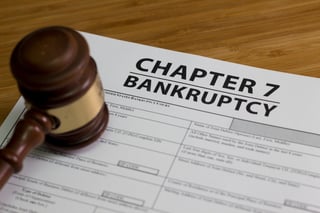Scura, Wigfield, Heyer, Stevens & Cammarota Blog
- Blog
How the Trustee Deals with Exemptions in Chapter 7 Discharge
 Chapter 7 Bankruptcy is known as the liquidation chapter, but this nickname is not really appropriate. In the vast majority of cases, liquidation never occurs. The Federal Bankruptcy Code and State Law in your particular jurisdiction allow for exemptions in property up to certain amounts to a debtor filing bankruptcy. If the value of your assets is less than the applicable exemption, than your property will not be liquidated and you will keep it. Stated otherwise, the exemptions protect property up to certain values from being liquidated. Many of our clients are surprised to learn that none of their assets will be liquidated and they can wipe out or discharge all of their debt. For a list of exempt property see our page on the Federal Bankruptcy Exemptions.
Chapter 7 Bankruptcy is known as the liquidation chapter, but this nickname is not really appropriate. In the vast majority of cases, liquidation never occurs. The Federal Bankruptcy Code and State Law in your particular jurisdiction allow for exemptions in property up to certain amounts to a debtor filing bankruptcy. If the value of your assets is less than the applicable exemption, than your property will not be liquidated and you will keep it. Stated otherwise, the exemptions protect property up to certain values from being liquidated. Many of our clients are surprised to learn that none of their assets will be liquidated and they can wipe out or discharge all of their debt. For a list of exempt property see our page on the Federal Bankruptcy Exemptions.
Does a Trustee Really Liquidate My Assets in a Chapter 7 Discharge Bankruptcy?
In most chapter bankruptcy cases, there is no property subject to liquidation because of the exemptions described above. In those cases that the value of property exceeds the allowable exemption, a trustee may liquidate property. From a practical standpoint, trustees are interested in recovering money for creditors but if property value is slightly over the exemptions, the trustees many times will not pursue the asset. If the assets are high enough above the exemptions, then of course the trustee will liquidate the property to pay creditors.
Settlement with the Bankruptcy Trustee in Order to Prevent Liquidation of Property
As discussed, in most cases the value of property in Chapter 7 discharge cases is less than the allowable exemption. In some cases, however, the value of non-exempt property does exceed the exemption. In those cases, you will also have the opportunity to settle with the trustee in order to prevent liquidation of property. For example, you are allowed a 20,200 exemption in real estate in New Jersey per individual. Suppose that the New Jersey debtor has $35,200 of non-exempt equity in the property. To prevent the trustee from liquidating the property an offer could be made to the trustee for that portion of the equity that is not exempt. In this illustration, $15,000 of the real estate is subject to being liquidated by the trustee to pay creditors.
In this example, your attorney could approach the trustee and make an offer of say $10,000 to prevent the trustee from liquidating the asset. The settlement offer makes sense for the trustee because it is a quicker way to get the money and without having to retain a broker and perhaps fight to have the property sold. The settlement makes sense for the debtor because they get to still wipe out their creditors and keep their property.
In cases in which the assets far exceed the amount of your allowable exemptions, and you do not have funds to settle with the trustee, your property can be liquidated. Keep in mind, however, that you would receive a refund back on the amount of your exemption after the property is sold. Back to the real estate example above, if you could not settle with the trustee and the real estate was liquidated, the trustee would have to refund $20,200 back because that is the amount of the allowable real estate exemption in New Jersey.
Contact a NJ Bankruptcy Attorney in Our New Jersey Offices
Prior to filing bankruptcy it is imperative to go over with your attorney the exemptions and strategies prior to filing the bankruptcy. Your goal with Chapter 7 discharge is to save as much of your property as possible and protect it from liquidation to pay creditors.
Our office offers a Free Consultation with a bankruptcy lawyer in our Wayne or Hoboken, New Jersey office conveniently located in Passaic County and Hudson County to discuss options with respect to bankruptcy planning and your exemptions.
Share Article
Need Help? Contact Us Today!





Lists by Topic
- Bankruptcy (320)
- Personal Injury (95)
- Chapter 13 (52)
- Chapter 7 (50)
- Debt Management (50)
- Foreclosure (47)
- Accident (32)
- Car Accident (26)
- Chapter 11 (24)
- Business Bankruptcy (19)
- Credit (18)
- Insurance Claims (17)
- Business Law (12)
- Litigation (12)
- Employment Law (11)
- Probate and Estate Law (11)
- Damages (10)
- Medical (10)
- Product Liability (10)
- Workers Compensation (10)
- Attorney (9)
- Consumer Bankruptcy (9)
- Commercial & Residential Real Estate (6)
- Slip and Fall (6)
- Contracts (5)
- Premises Liability (5)
- Repossession (5)
- wrongful death (5)
- Video | Bankruptcy (4)
- Bankruptcy Cost (3)
- Corporate Litigation (3)
- Trial Law (2)
- student loans (2)
- tax (2)
- Attorney Fees (1)
- COVID-19 (1)
- Certified Civil Trial (1)
- Dog Bites (1)
- News (1)
- Relocation Assistance (1)

